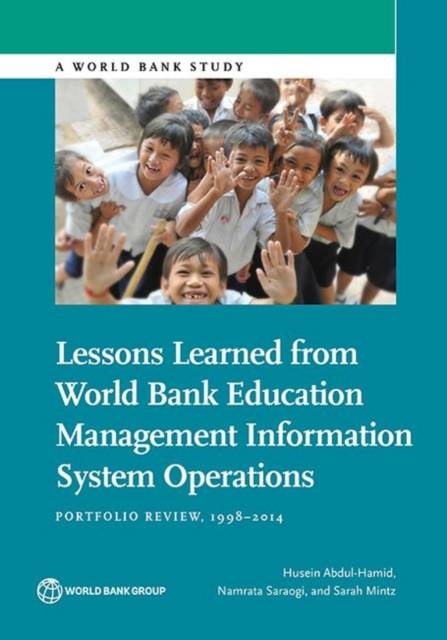
- Afhalen na 1 uur in een winkel met voorraad
- Gratis thuislevering in België vanaf € 30
- Ruim aanbod met 7 miljoen producten
- Afhalen na 1 uur in een winkel met voorraad
- Gratis thuislevering in België vanaf € 30
- Ruim aanbod met 7 miljoen producten
Lessons Learned from World Bank Education Management Information System Operations
Portfolio Review, 1998-2014
Namrata Saraogi, Sarah MintzOmschrijving
This report provides an overview of the World Bank Education's portfolio in the area of Education Management
Information Systems (EM ISs) over the course of 17 years from 1998 to 2014. It seeks to identify overall trends
and characteristics of Bank support in this area, with the intent of informing future project preparation and
analytical work. Although several good practices were evident, operational performance of EMIS activities fell
short of expectations, with widespread deficiencies that ranged from unclear definitions and understanding of the
EMIS to ineffective implementation and utilization. Future projects could benefit from the SABER EMIS
Assessment Framework.
The SABER EMIS framework focuses on the need for a (a) strong enabling
environment, (b) system soundness, (c) quality data, and (d) effective utilization as the key factors essential for
the successful implementation of EMIS. This initial needs assessment of a country's EMIS can playa critical role
in benchmarking countries and provide a valuable foundation for the design of new projects. Examples of
successful EMIS activities include (a) development of an EM IS to manage teachers and provide access to
education (e.g., Afghanistan); (b) utilization of an EMIS as a management tool (e.g., Bosnia and Herzegovina);
(c) creation of an online EMIS to improve access to education data (e.g., Honduras); (d) using an EM IS as a tool
to strengthen teaching and learning (e.g., Lithuania and Guatemala); and (e) using an EM IS as a management
tool for schools (e.g., Malaysia). These success stories highlight how awell-implemented EMIS can improve the
performance of an education system.
Specificaties
Betrokkenen
- Auteur(s):
- Uitgeverij:
Inhoud
- Aantal bladzijden:
- 160
- Taal:
- Engels
- Reeks:
Eigenschappen
- Productcode (EAN):
- 9781464810565
- Verschijningsdatum:
- 12/04/2017
- Uitvoering:
- Paperback
- Formaat:
- Trade paperback (VS)
- Afmetingen:
- 178 mm x 254 mm
- Gewicht:
- 290 g

Alleen bij Standaard Boekhandel
Beoordelingen
We publiceren alleen reviews die voldoen aan de voorwaarden voor reviews. Bekijk onze voorwaarden voor reviews.







